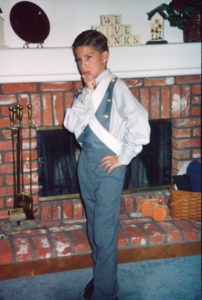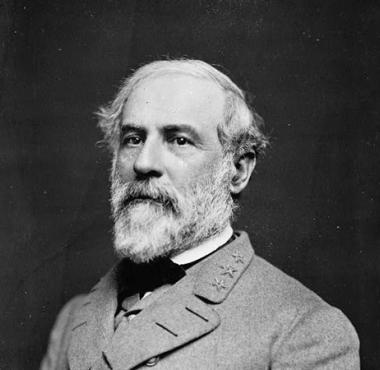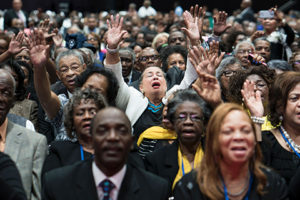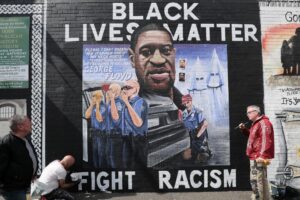Thes past few weeks have sucked. By far, I cannot remember a more emotionally draining, politically charged season. I kept looking at the news to see what would happen next; I kept checking Facebook to see what my friends and acquaintances thought about the events that have been unfolding. My heart is so burdened by the amount of ignorance, hatred, and complete lack of empathetic love I have seen at Charlottesville and online. I am convinced that America, and more specifically, a large portion of the Church in America, have forgotten and forsaken Jesus Christ. I believe that we have a lot to learn about empathetic love from the God who willingly carried the instrument of his death.
A lot of our problems lie in the inability to get over ourselves. I believe theologians call this selfishness as we believe that our opinion and life is the only one that matters. We love ourselves, but not our neighbors as ourselves. As demonstrated by this past week, we have such a hard time seeing an issue from another’s perspective. I’ve heard Christians bemoan the “liberal agenda that is erasing history”, deflect and shift blame from literal Nazis and KKK members to people who got ran over by them, and even ask an African American woman why she is complaining if we are supposed to be slaves of Christ. Surely, this is not what Jesus had in mind when he prayed to the Father, “I made known to them your name, and I will continue to make it known, that the love with which you have loved me may be in them, and I in them” (John 17:26).
What would it look like if the Church embodied the empathetic love of a crucified king? Could we imagine a world transformed by the gospel in which nuclear war was never a threat to be launched? A world where explicit and implicit Racism no longer existed to march proudly through the streets or were memorialized as symbols of injustice? Could we imagine a world without the vitriol, hatred, and condemnation that can so easily be found on social media? Could we imagine a world without book reports on Robert E. Lee?
Ok, you probably weren’t expecting that last one. The backstory is that in second grade, I had to write a book report on a famous historical figure and dress up as them for a school assembly. They could be important scientists, writers, leaders, or anything you wanted. I chose to do my report on Robert E. Lee, the general of the southern army in the American Civil War. Now, I believe I chose him because I was told I was related to him, and like any 7-year-old boy, I really liked learning about war. I also really liked striking weird poses as well:


However, I remember feeling the slight need to justify my choice by explaining that Robert E. Lee was in contrast “nice” to his slaves and that in the end, he freed them. He didn’t really like slavery, he just didn’t want to fight against his home-state. Don’t believe 2nd grade me? Just read Lee’s own words as recorded in full by the Conservative Push article entitled, “Here’s Why General Robert E. Lee Has Been And Always Will Be An American Hero”
In 1856, Lee wrote a letter to his wife that read:
“…In this enlightened age, there are few I believe, but what will acknowledge, that slavery as an institution, is a moral & political evil in any Country. It is useless to expatiate on its disadvantages. I think it however a greater evil to the white man than to the black race, & while my feelings are strongly enlisted in behalf of the latter, my sympathies are more strong for the former. The blacks are immeasurably better off here than in Africa, morally, socially & physically. The painful discipline they are undergoing, is necessary for their instruction as a race, & I hope will prepare & lead them to better things. How long their subjugation may be necessary is known & ordered by a wise Merciful Providence.
— Robert E. Lee, to Mary Anna Lee, December 27, 1856”
My childhood hero just explained that Black people are better off being oppressed as slaves than being free in the land of their ancestors. Furthermore, this institution, though evil, is necessary to teach them. (Teach them what?). In the end, Lee decided to not oppose slavery and the subjugation of people of color and left the decision of intervention up to “Merciful Providence.” If you are nodding in agreement then imagine telling your black friend these things. If you’re offended by this or can imagine someone being offended by this, you are seeing these comments for what they are: vile racism.
While this southern sentiment may fool a second grader into thinking his hero is a moral exemplar -that somehow being nice to slaves excuses the institution altogether- it should not bewitch a swathe of the country. We can, on one hand, say that Lee’s ideas about people of color were culturally and historically conditioned, but we can also still say that his worldview is evil and he is probably not the best role-model for a second-grader.
What shocks me is that no teacher or authority stopped and talked to me about choosing a different historical figure. As far as I can remember, no one raised a fuss, much less an eyebrow. But why should they? At a predominately white private Christian school, this probably never crossed their mind. I, myself, had almost forgotten this incident – the only black kid in my class did not. A year later, with the same lack of eyebrow raising, I dressed up as another famous southern general, Stonewall Jackson.
Now, I do not think anyone reading this would call me a racist or that I was intentionally being insensitive or culturally offensive. The reason is that we have all been children before, and we have all done things and said things that we would never dream of doing now. We can look back with a matured view of the world, and, holding the new knowledge in tension with what we thought we believed then, we can grow and develop. This is good self-reflection when we take a hard look in the mirror, yet we do so with charity and empathy.
We can do the same for people like Robert E. Lee. We can look back with greater understanding clothed with charity and empathy. When we do so, we will see a man, caught up in an evil institution and forced to make a choice between fighting against his brothers or fighting for the cause of a people he wrongly thought were animals and property. When we understand the worldview of Southern, land-owning, upper-class whites in the 1860s, the choice to fight should not a be shocker. Lee – A southern man entrenched in one of the most egregious evils this world has ever seen – made a choice to hold onto power instead of giving it up. Though this may be shocking to us, if we can imagine living during that time, with that worldview, and within the white beneficiary part of that institution, we probably would have done the same. Lee may have done great things for the South, or for his soldiers, or before the war, or after the war, or even for his slaves that makes him memorable and worthy of praise and recognition. But this recognition must never turn into the ‘Lost Cause’ memorial; this recognition must always be tempered with the realization that Lee ultimately chose slavery of people of color over empowering them. This is charity: a love-seeking-understanding where we can remember the past in truth without totally romanticizing or completely demonizing it. We can look at people of history as just that: people. They are mixed bags, both good and bad at different times, just like us. Just as we desperately want to be understood, we should try to understand others.
Now, imagine if we took all of that good empathy, all of that wonderful charity, that Christ-like love that seeks to understand, and we used it to see how things look from the perspective of a person of color. Imagine if we saw the issue of Confederate statues from the perspective of someone who was enslaved to the person being commemorated. What if we saw the event at Charlottesville from the perspective of someone who’s parents were lynched by the KKK or a white-supremacist mob? What if we held every experience and thought in tension with the perspective of “the other”? Imagine if our knee-jerk reaction to this wasn’t, “but what about them?”
In America, the culture at large has a clear problem with institutionalized racism. Past and present laws, events, institutions, and prejudices have wreaked havoc among people of color, and yet we can’t even make up our minds if any of it is real. White people (myself included) are more likely to believe a black person about racial injustice when they are represented or supported by a white person, but both people are overruled by a black person who denies racial injustice. In short, it’s hard to be charitable to someone who is challenging your perspective; It’s even harder to be empathetic to someone who is calling to account an institution you have been apart of for so long.
Not to minimize institutionalized racism or prejudice of any sort whatsoever, but what lies deeper at the root is pride – a self-supremacy. We are unable and, at times, simply unwilling to see things from another’s perspective. Instead, we advance whatever narrative that fits our self-serving motives, and so, we oppress others without even realizing it. We desire power, and like Lee, we would rather fight than to give it up.
If we go even deeper into the broken ruins of the human heart, we would find that behind the notion of self-supremacy is that innate desire to be known and loved. At the end of the day, I don’t care if you agree with me, I only truly want you to understand where I am coming from. And at the end of all of this, all I truly want is to be loved. This is where Jesus comes in. God, the creator of all things and peoples and all skin colors and accents, decided to be a certain type of God who sacrificed everything to enter into your world. This God entered into the oppression and brokenness of a world filled with slavery and injustice. He entered into the world of a continuously conquered people and took on the systems of oppression as if it were his own. He did all of this in love so that we might be reconciled to himself and to each other. He did this at the expense of himself, as he carried the shameful instrument of his death, only to be murdered by the coalition of the various religious, social, and militant oppressor of the day. In the end, Jesus rose victorious as the Lamb who was slain- the crucified Lord. He began a new institution, the Church, who would empower people as a loving family instead of enslaving as a power-hungry despot. Through self-sacrifice, and empathetic love and humility, this new institution would be the instrument by which God would renew all things.
Yet, the Church seems to have forgotten this. Some have been defending bronze busts of treasonous oppressors while ignoring the deep cries for love of the image bearers of God in front of them. Even though we know Jesus and have experienced his love and grace, we often choose not to extend to others the same amount of empathetic love that we freely give out to those who look like us and that we so desperately require ourselves. This is not what we have learned in Christ.
In Christ, we see a God who eagerly enters into our condition and allows himself to be murdered for our benefit. This is the empathetic love that the Church needs so desperately: God entered into our lives to know us and love us, and we should do the same for one another. The growing tension of our times we are feeling can be resolved if we simply took the time to listen to and love one another. If we entered into someone else’s world and saw things through their eyes, we would be slower to anger and quicker to love. In doing so, we emulate the very heart of Jesus, the crucified Lord.
Charlottesville needs to be a wakeup call to those in the Church who are still asleep. Racism is real, its effects are still destructive, and many people are in need of the empathetic love of the Jesus. We can only do this if we acknowledge our self-supremacy, and recognize that our desire to be known and loved is to be found in Jesus Christ. We then must take that empathetic love we experienced ourselves, and we must boldly share it with others. The greatest thing about true power is that, like this empathic love, it is not a zero-sum game. In fact, just the opposite: the more love I share and the more power I give to others, the more I come to know the Creator of such power and love and become who I am supposed to be. I grow more whole as a person as I image and reflect the one who created me. No amount of “history lessons”, press conferences, or blog posts will solve this problem. The church desperately needs to rediscover the Jesus, the one who lovingly gave himself for others, and begin imaging and reflecting this Jesus to others. The Church needs to once again be the instrument for renewal in a broken world, empowering the oppressed, being a voice for the voiceless, and even loving those who are difficult to love. The World is desperate for the empathetic and redemptive love that only Jesus offers, but will they experience it through the God’s people?





1 Comment
Leave your reply.